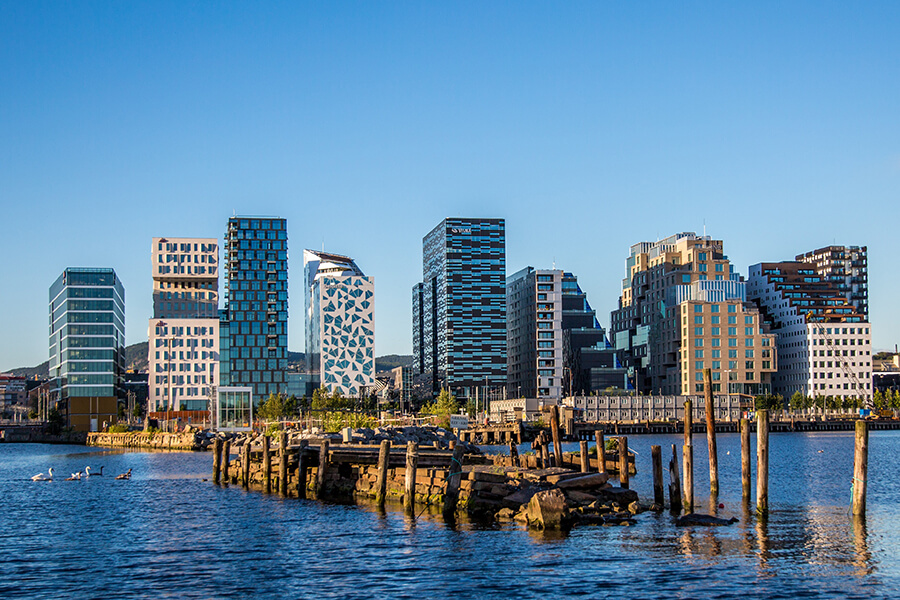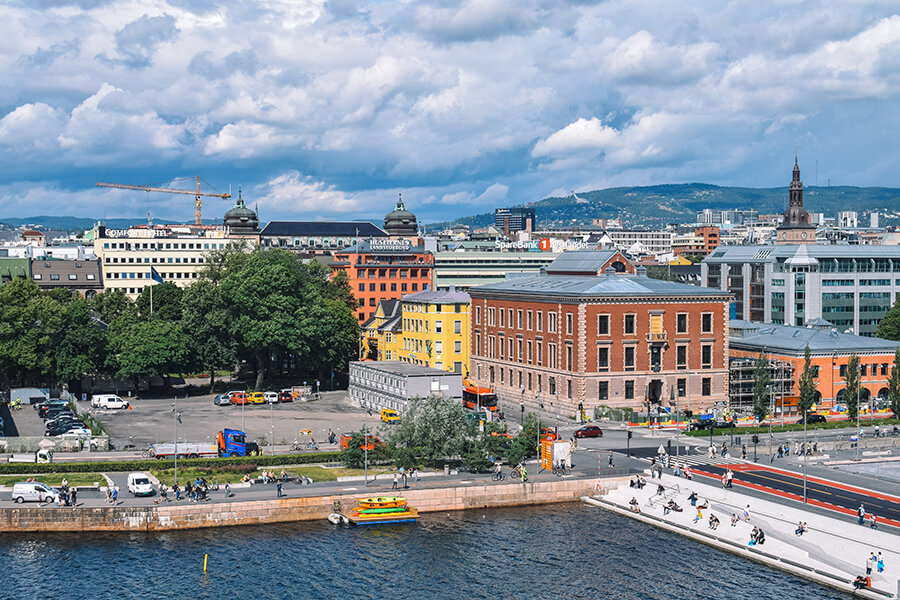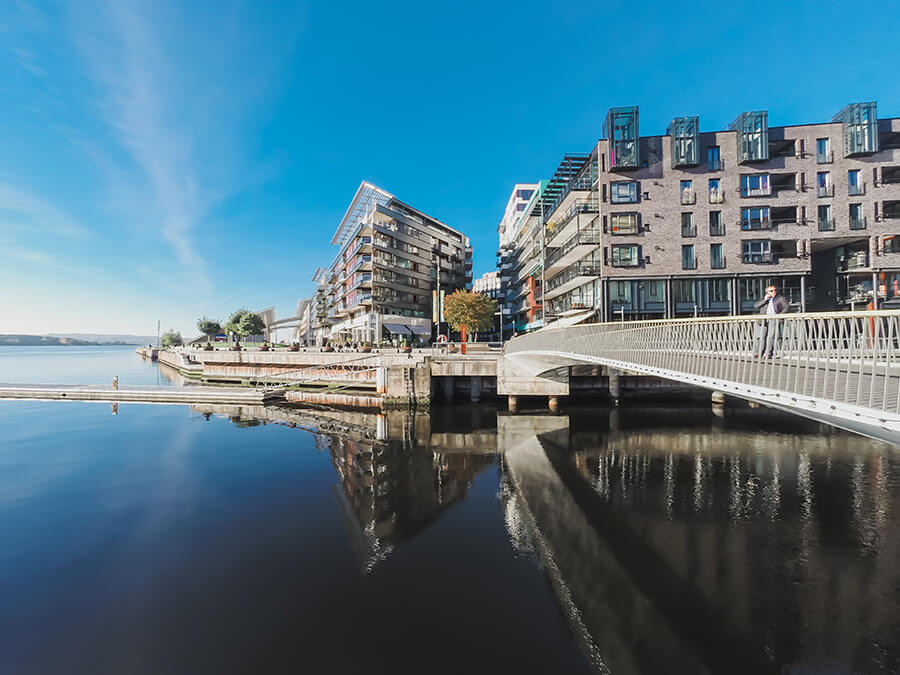Oslo is the capital and most populous city of Norway, with a population in the urban area exceeding 1 million. It has continually ranked as one of the most liveable and most expensive cities in Europe.

IT salaries in Oslo
The average IT salary in Oslo is NOK 61,990 per month (NOK 743,910 per year).
Here are the average IT salaries in Oslo (NOK per year, before taxes) depending on the specialization, according to Salary Explorer:
- Android developer: 616,000
- Angular developer: 571,000
- Blockchain developer: 574,000
- Business Intelligence developer: 686,000
- C# developer: 677,000
- C++ developer: 692,000
- Data analyst: 614,000
- Database administrator: 673,000
- Front-end developer: 550,000
- Full-stack developer: 626,000
- Game developer: 610,000
- Information security specialist: 805,000
- IT project manager: 1,010,000
- iOS developer: 687,000
- Java developer: 671,000
- JavaScript developer: 644,000
- Network engineer: 558,000
- PHP developer: 575,000
- Python developer: 654,000
- Ruby developer: 581,000
- Salesforce administrator: 608,000
- Salesforce developer: 508,000
- Scrum master: 516,000
- SharePoint developer: 675,000
- Software architect: 652,000
- Software engineer: 606,000
- Software QA engineer: 589,000
- Software test engineer: 564,000
- Solutions architect: 871,000
- Systems architect: 624,000
- Technical writer: 597,000
- UX designer: 568,000
- Web designer: 545,000
- Web developer: 561,000
Economy
Oslo is the economic and governmental center of Norway, an important hub of banking, maritime trade, maritime industry and shipping. The city is home to over 2,650 of the largest companies in Norway, including many maritime, oil and gas corporations.
The unemployment rate in the Oslo area was 3.9% before the COVID-19 pandemic — slightly higher than the national average of 3.5%. The unemployment rate in the Norwegian capital reached 13.1% in April 2020 due to the pandemic (10.2% across the country).

Important economic sectors in Oslo include:
- Banking
- Information and communications technology (ICT)
- Maritime industry
- Oil and gas
- Research and development (R&D)
The Oslo region is the center for mobile technologies as well as business, research and development. Recent years have witnessed a large number of start-ups in the region, and several internationally renowned companies, such as Google and Microsoft, have chosen to locate there.
With the Department of Informatics, the University of Oslo is the largest educational institution for ICT within the region. It provides Norway with an important research environment for ICT.
The largest technology companies present in Oslo and its surroundings include:
- Cisco
- Funcom
- Google
- Kongsberg
- Microsoft
- Opera
- Telenor
And here are some of the notable start-ups:
- Disruptive Technologies
- Fuse
- Kahoot!
- ReMarkable
- Schibsted
- Swarm64
- Visma
- Zwipe
Renowned R&D environments can also be found at Fornebu, Kjeller, Halden, and Horten — all located within a 100 km radius from Oslo.
Cost of living in Oslo
Oslo is the 7th most expensive city in Europe according to Numbeo Cost of Living Index. The Norwegian capital is outridden only by Swiss cities.
The average monthly costs in Oslo are about NOK 10,780 for a single person or NOK 39,230 for a four-person family (excluding rent).

Here are examples of the average prices in Oslo (NOK):
- Meal at McDonald’s: 100–120
- Meal at another inexpensive restaurant: 125–300
- Average food basket (milk, bread, eggs, cheese, chicken, apples, potatoes, water, beer): 427
- Monthly fee at a fitness club: 300–600
- Monthly pass: 750–780
- Monthly rent (1 bedroom): 8,000 – 15,000
- Monthly rent (3 bedrooms): 14,000 – 28,000
- Property prices per square meter: 40,000 – 100,000
- Utilities: 850 – 2,830 per month
- Internet: 300–700 per month
Travel
The main airport serving Oslo is Gardermoen Airport, located 47 km from the city center. It’s the sixth-largest domestic airport in Europe. It serves flights to many European destinations as well as Addis Ababa, Bangkok, Beijing, Dubai, Islamabad, Lahore, New York, Tel Aviv, and many others.
As for traveling within the city, Oslo has a good public transport system, with the world’s most extensive metro per resident, the Oslo Tramway, and the Oslo Commuter Rail.
Entertainment
Oslo has 8 large parks (plus 2 major forests bordering the city), a lake with a hiking area, 8 public swimming pools, and many museums (the Fram Museum, the Viking Ship Museum, the Kon-Tiki Museum, etc.).
Popular locations in Oslo include Oslo Harbor and its promenade, Oslo Opera House, Tjuvholmen Sculpture Park, Akershus fortress, the Barcode strip and other modern buildings, and the Vulcan neighborhood with many restaurants and music venues.
In addition, Oslo hosts many annual events, including the Nobel Peace Prize Ceremony, the World Cup Biathlon, Desucon, a convention focusing on Japanese culture, Færderseilasen, the world’s largest overnight regatta, Oslo Jazz festival, and more.